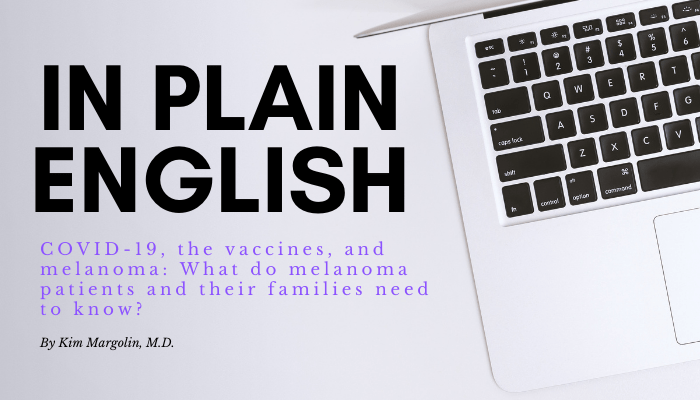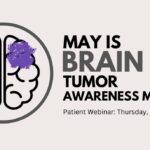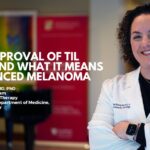
By Kim Margolin, M.D.
Coronavirus is novel (new), and the vaccines are even newer, so little melanoma-specific information is available. But there are some data, and we will share what is known. We’ll also share what is known about COVID-19 and other cancers, which provides useful information in thinking about the similarities and differences to melanoma.
In this article, we’ll answer four questions:
- What are the risk factors for life-threatening or fatal outcomes of COVID-19, and are any of them related to cancer or cancer treatment?
- What do we know about the vaccines?
- What do we know about COVID infection in patients with melanoma and other cancers?
- What do we know about COVID vaccines in patients with melanoma and other cancers?
What are the risk factors for life-threatening or fatal outcomes of COVID-19, and are any of them related to cancer or cancer treatment?
The SARS-CoV2 coronavirus pandemic has reached staggering numbers throughout the world, sparing no country or cultural group from a highly-contagious disease ranging from completely asymptomatic to life-threatening or fatal infection. Although the principal cause of death is a severe viral pneumonia (infection of the lungs) that overcomes the ability of the lungs to maintain adequate oxygen supply to the rest of the body, the virus can also cause inflammation and failure of many other organs. And a seeming contradiction is that some consequences of coronavirus result not from the virus infecting our organs but from the body’s strong immune response to viral infection, and the toxic effects of this immune reaction against our tissues.
Many studies have been done to understand the risk factors for life-threatening or fatal outcomes of COVID-19 infection. It would also be very valuable to understand what factors protect many individuals and allow them to have infections without any symptoms (but unfortunately capable of spreading the virus to other people). So far, only a few patient characteristics have been identified to be more common in people with bad outcomes, and they have in common the inflammation of blood vessels, which lead to complications in many organs as well as a tendency to abnormally increased blood clots. These underlying conditions include diabetes, hypertension (high blood pressure), and vascular diseases (hardening of the arteries in one or more of the important places like the brain, kidneys, heart, and legs). Pre-existing lung disease and an abnormal or suppressed immune system (from medication or a disease) are also risk factors. Patients with melanoma may have these risk factors independent of their melanoma, but none of these factors is caused by melanoma.
Because melanoma occurs at an average of 10 years younger than other cancers and isn’t caused by the risk factors that cause both lung cancer and blood vessel disease (mainly smoking, obesity and diabetes), melanoma patients are expected to have the lowest risk for COVID complications if they do get infected. Also, the immune system may be weakened by prior chemotherapy or radiation, which are used frequently for other cancers but very rarely for melanoma. Furthermore, the most common melanoma treatments, immunotherapies, and targeted therapies (discussed in detail in “In Plain English”: What is a “Triplet,” and Why Does it Matter in Melanoma?) do not suppress immunity—they actually stimulate the immune system, which is a powerful treatment for melanoma but may cause autoimmune reactions (immune system attacking your own tissues) that could be worsened with COVID infection.
What do we know about the vaccines?
Remarkably, in a period of under a year, several vaccine candidates were produced, based on the rapid adaptation of methods that were recently developed to create vaccines against cancer (these vaccines are looking promising but have a long way to go before they are used in cancer). Then, working on an aggressive timeline and in parallel, the first two vaccine companies—Pfizer/BioNTech and Moderna—vaccinated nearly 75,000 volunteers as part of their clinical trials. Importantly, these vaccine volunteers were participating in trials that required them to be randomly assigned 1:1 (equivalent to a coin-flip) to either the vaccine or a placebo (a shot of the same quantity of fluid without any vaccine material) for both injections. The clinical trial volunteers agreed to be unaware if they were receiving a vaccine or placebo.
The results showed that both vaccines provided high levels of protection (95%) against COVID infection at any level of severity and prevented all subjects from the most severe infections. This extremely high level of protection for a vaccine created so quickly is truly remarkable.
After these results were confirmed and published in record time, the FDA quickly awarded emergency use authorization to the Pfizer/BioNTech and Moderna vaccines on December 11 and December 18, 2020, respectively. The vaccines have been generally well-tolerated with about half of vaccinated people experiencing flu-like side effects, mainly after the second injection. Only a handful of serious events, such as severe allergic reactions, and a small number of deaths have been reported, with questionable attribution to vaccine (some occurred in individuals assigned to placebo).
Again, these two vaccines protected people from severe COVID disease and death from COVID, the two consequences of infection that are most important to eradicate as effectively and as soon as possible. But there are still some things we don’t know. One is whether the Pfizer/BioNTech and Moderna vaccines can fully prevent the virus from infecting vaccinated individuals. In other words, even if they don’t get sick, can vaccinated people still acquire the virus? And if vaccinated people can still acquire the virus, can they spread enough virus to infect and sicken others who have not been vaccinated? There is also the recent problem of mutations occurring in SARS-CoV2 that may enhance the contagiousness of the virus, with or without increasing the severity of infection and rate of death. We don’t know enough yet about how well the vaccines will protect against illness caused by virus that has these mutations, but we are starting to get data, so we should have a better idea soon.
Despite the new mutations, expert opinion is uniform in advising that the best way to avoid sickness and death from either the original SARS-CoV-2 or from any of the current or future mutated forms is to achieve “herd immunity,” and that getting as many people vaccinated as quickly as possible is the way to achieve herd immunity. Simply put, herd immunity is the point at which a high percentage of people are vaccinated or have had coronavirus infection and are immune. When this is achieved, the likelihood is much lower that people will be exposed to virus and get sick and possibly die of their infection. Also, the faster we can get to this point, the less viral replication is happening, which means the rate of developing new mutations (that depend on virus multiplying) goes way down. When speaking of herd immunity, what is that “high percentage”? Experts believe 60-80% of the population must be immune in order to achieve herd immunity.
What do we know about COVID infection in patients with melanoma or other cancers?
To summarize many separate studies, it is generally accepted that a diagnosis of cancer per se is not an independent risk factor for a serious or fatal case of COVID-19. In other words, just because you have cancer doesn’t mean you are at increased risk for developing serious or fatal COVID. However, lowered immune defenses are connected with a less favorable outcome of COVID infection, and some cancer treatments negatively affect the immune system. Current thinking is that mainly those cancer treatments that lower the immune defenses can worsen the outcomes of COVID-19 infection. Examples of therapies that lower the immune defenses are some chemotherapies, steroids used for long periods or at high doses, and extensive radiation therapy. These treatments are generally not used for melanoma.
Lung cancer, however, is a unique case, since the lungs are the major target organ for the virus, and other aspects of lung cancer and its treatment contribute: Prior lung surgery reduces the volume of lung tissue, prior radiation therapy can scar and shrink the lungs, and some chemotherapies and targeted therapies can have direct toxic effects against the lung tissue.
The data specific for patients with a history of melanoma who develop COVID-19 are very limited, but a recent report from Spain detailed 70 patients with melanoma, over half with metastatic melanoma and just over half also on systemic therapy. Of those on therapy for either Stage III (adjuvant treatment to prevent relapse) or Stage IV melanoma, slightly over half were receiving PD-1-blocking antibody and slightly under half were on targeted therapies (BRAF plus MEK inhibitors, discussed in an earlier “In Plain English”). The rates of all outcomes, including severity of coronavirus infection, were similar regardless of the stage of melanoma and whether and what type of therapy these patients were receiving. Comparison with other cancers and treatments was not possible in this study, but the indirect evidence strongly favored the conclusion that neither the diagnosis of melanoma nor its therapy has any significant effect on a COVID-19 infection.
What do we know about the COVID vaccines in patients with melanoma or other cancers?
It has been much more difficult to assess the impact of underlying conditions on the tolerance and efficacy of the COVID-19 vaccine, since the experience with vaccinating people outside of the studies has been occurring for only two months at the time of this writing. In the trials, to assure safety and to accurately assess the impact of the vaccine on infection rate and severity of infection, people with any significant underlying disease or other risk factors, such as cancer, were excluded. Nevertheless, the lack of serious toxicity among the large number of individuals who have now received vaccine from Pfizer/BioNTech, Moderna, or other vaccine companies now completing clinical trials provides strong reassurance that the likelihood of complications should also be low in less strictly-selected groups.
Most of the guidance regarding COVID vaccination for melanoma patients comes from indirect evidence suggesting a high level of both safety and efficacy (protection against both viral infection and reduction of the severity of any viral infection that occurs despite vaccination). In other words, what we know so far suggests that getting the vaccine is both safe and effective for melanoma patients, just as it is for the general population.
Like any new field of medical science, emerging data and observations may change the current recommendations, but for now, they are as much as possible based on evidence at hand. Your oncologist and primary care doctor may not be familiar with the research on the vaccines’ safety for melanoma patients, as the data is so new and limited. Feel free to bring this article to your appointment as part of your discussion.
If you have any questions about COVID or the vaccine, you should speak with your healthcare provider.

Kim Margolin, M.D.
Dr. Margolin is a medical oncologist specializing in melanoma and other skin cancers. She worked at City of Hope for 30 years and also held faculty positions at the Seattle Cancer Care Alliance/University of Washington and at Stanford University. Among her academic achievements were long-term leadership of the Cytokine Working Group, leadership involvement in the Cancer Immunotherapy Trials Network, participation in the Southwest Oncology Group’s Melanoma Committee, and many positions in the American Society of Clinical Oncology and the Society for Immunotherapy of Cancer. Dr. Margolin has reviewed grants for many cancer-related nonprofit organizations and governmental agencies. She has also served as a member of the Oncology Drugs Advisory Committee to the FDA, the American Board of Internal Medicine’s Medical Oncology certification committee, and the Scientific Advisory Committee of the European Organization for the Research and Treatment of Cancer.
Dr. Margolin collaborates with AIM at Melanoma to write the monthly “in Plain English” to provide timely updates on new developments for patients, caregivers, and other individuals with an interest in medical advances in melanoma.
Recent Posts

Navigating the Journey Together – Conversations with Melanoma Caregivers

May is Brain Tumor Awareness Month

President’s Letter | April 2024

Celebrating a Milestone: 20 Years of the Dallas Steps Against Melanoma Walk

